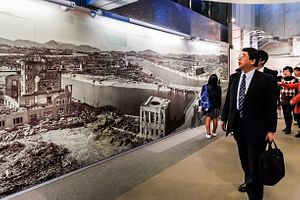With the end of 2015, a year of commemorating the 70th anniversary of the end of World War II, the curtain closes on another chapter in the recurring historical debates in Northeast Asia. Despite signs of a thaw in political relations between Japan and its neighbors, China and South Korea, deep differences in historical perceptions – and historical responsibility – have not changed.
It’s not surprising, however, that there’s no consensus on history among the three neighbors because there is no consensus within Japan itself. Historical narratives spark debate and controversy domestically, among society at large as well as within the political elite. Just as former Prime Minister Tomiichi Murayama, author of the famous Murayama statement, was attacked by right-wing critics for going too far in criticizing Japan’s wartime deeds, current Prime Minister Shinzo Abe has been attacked by left-wing critics for being an apologist and revisionist.
Behind the politics, behind the international disputes, there’s the central question of how modern Japan remembers history. And there’s no better place to start unraveling this monumental topic than by a visit to the site that, in many ways, has come to embody the controversy: Yasukuni Shrine, in Tokyo.

































